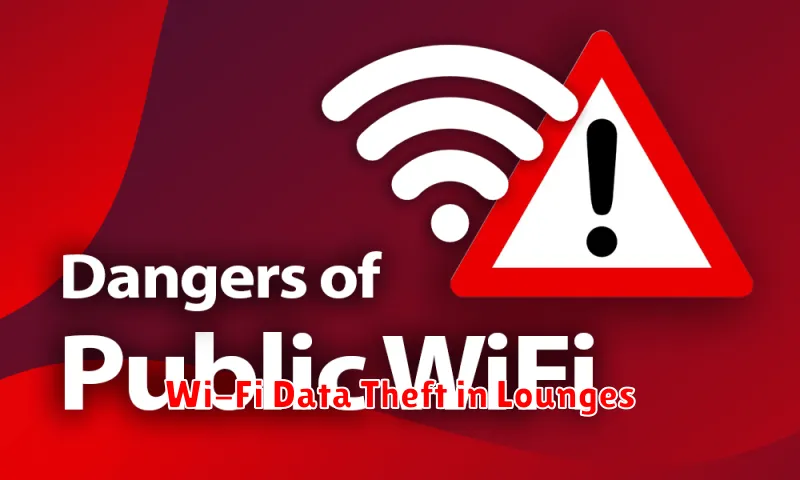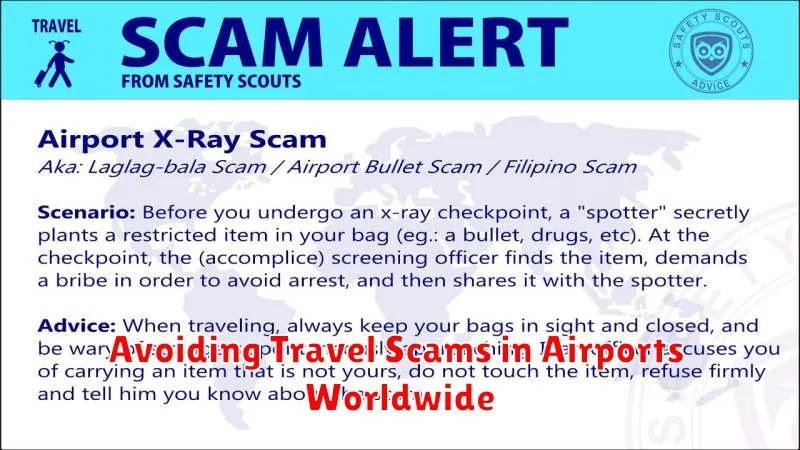Traveling can be an exciting experience, but it’s crucial to be aware of potential travel scams that can quickly turn your dream trip into a nightmare. Airports worldwide, often bustling with activity, can be prime locations for scammers looking to prey on unsuspecting travelers. From baggage scams to currency exchange trickery and taxi scams, being informed and prepared is the best defense. This article will provide you with valuable insights and practical tips to help you avoid travel scams and navigate the airport environment safely and confidently. Learn how to identify common airport scams, protect yourself from becoming a victim, and ensure a smooth and enjoyable travel experience.
Falling victim to a travel scam can result in financial losses, wasted time, and added stress to your journey. By understanding the tactics used by scammers in airports, you can significantly reduce your risk. This comprehensive guide will cover various airport scams, including Wi-Fi scams, fake officials, and distraction techniques. Equipping yourself with the knowledge presented here will empower you to stay vigilant, recognize potential threats, and avoid travel scams, ensuring a positive and memorable travel experience from the moment you arrive at the airport.
Scams That Start Before You Leave
Several travel scams can target you before you even set foot in an airport. Being aware of these schemes can save you money and hassle. Pre-booked taxi or ride-sharing scams often involve inflated prices or outright no-shows. Always confirm the legitimacy of the service and the expected fare. Fake visa websites mimic official government sites and charge exorbitant fees for unnecessary or non-existent visa processing. Phishing emails disguised as airline or hotel confirmations may attempt to steal your personal information or credit card details. Verify all communications by contacting the company directly through official channels. Third-party booking site issues can range from hidden fees to outright fraudulent bookings. Use reputable booking platforms and double-check the details of your reservation.
Social media scams often involve fake contests or promotions that require you to share personal information or click on malicious links. Be wary of unsolicited offers that seem too good to be true. Exercise caution when engaging with any travel-related offers online.
Fake Taxi and Shuttle Services

Unlicensed taxi and shuttle services are a common scam at many airports. These drivers often target travelers who appear lost or unfamiliar with the area. They may offer a “better” rate than official taxis or shuttles, but often end up overcharging significantly or taking longer, circuitous routes.
Identify legitimate transportation. Look for official markings on vehicles, such as airport logos or designated taxi numbers. Pre-booked airport transfers are a safe option, as is using established ride-hailing apps. Confirm the driver’s identity and the agreed-upon fare before starting your journey.
Ask airport personnel. If you are unsure about a transportation service, inquire at the airport’s official information desk or with an airport employee. They can direct you to authorized taxi stands or shuttle pickup locations.
Wi-Fi Data Theft in Lounges

Airport lounges often offer complimentary Wi-Fi, a welcome convenience for travelers. However, these networks can be a hotbed for data theft. Unsecured or poorly secured Wi-Fi networks make it easy for criminals to intercept your online activity.
Avoid accessing sensitive information like online banking or email accounts while using public Wi-Fi. Criminals can employ tactics like “man-in-the-middle” attacks to steal your login credentials, credit card numbers, and other personal data.
Consider using a Virtual Private Network (VPN). A VPN encrypts your internet traffic, shielding your data from prying eyes. This adds a layer of security even on compromised networks.
If you must access sensitive information, use your phone’s data connection as it is generally more secure than public Wi-Fi. Exercise caution and be aware of your digital surroundings.
Currency Exchange Trickery

Airport currency exchange kiosks are often notorious for offering unfavorable exchange rates. Avoid these unless absolutely necessary. Their convenience comes at a steep price.
Be wary of hidden fees. Some kiosks advertise “no commission” but build the cost into a poor exchange rate. Always ask for the final amount you will receive before exchanging any money.
Double-check the calculations. Ensure the exchange rate used matches the advertised rate and that the final amount is correct. Don’t be afraid to walk away if something seems off.
A common trick is confusion with denominations. Be absolutely clear on the local currency and its various notes and coins. Scammers may try to shortchange you, especially if you are unfamiliar with the local currency. Count your money carefully before leaving the counter.
Overpriced SIM Card Vendors
One common airport scam targets travelers needing local SIM cards. Unscrupulous vendors often position themselves prominently within arrival areas, preying on jet-lagged passengers eager for convenient communication. These vendors frequently charge exorbitant prices for SIM cards readily available at significantly lower costs outside the airport.
Resist the urge to purchase a SIM card immediately upon arrival. Research local providers and typical SIM card prices in your destination country beforehand. This preparation will allow you to recognize and avoid inflated prices. Consider purchasing a SIM card at a reputable store in the city center or even arranging for one online before your departure. Doing so will not only save you money, but also ensure a more reliable and secure connection.
Lost Baggage Compensation Fraud
Lost baggage is a common travel misfortune, creating an opportunity for scammers. This fraud preys on travelers’ frustration and desire for quick reimbursement. Be wary of individuals approaching you with offers of assistance regarding lost luggage, especially if they’re not affiliated with the airport or airline.
These scammers may pose as airline representatives or airport officials, offering to expedite the compensation process for a fee. They might request personal information, such as your baggage claim tag number, passport details, or banking information, under the guise of processing your claim. Never provide such sensitive information to anyone other than authorized personnel at the airline’s official lost baggage counter.
Always follow the official procedures for reporting lost baggage. Report directly to the airline’s designated lost baggage desk and obtain a file reference number. Keep all your travel documents and receipts readily available. If someone approaches you unsolicited with offers of assistance, politely decline and proceed to the official channels.
Tips to Stay Aware
Staying aware of your surroundings is the first line of defense against airport scams. Vigilance can help you identify suspicious behavior and avoid becoming a target.
Be Mindful of Distractions: Scammers often work in teams, using distractions to create opportunities for theft. One person might spill something on you or ask for directions while an accomplice targets your luggage.
Secure Your Belongings: Keep your luggage within your sight at all times. Never leave valuables unattended, even for a moment. Consider using luggage locks and tags to deter theft.
Limit Personal Information: Be cautious about sharing personal information with strangers. Avoid discussing travel plans or displaying large amounts of cash.
Trust Your Instincts: If a situation feels wrong or a person seems suspicious, remove yourself from the situation immediately. Report any suspicious activity to airport security.

